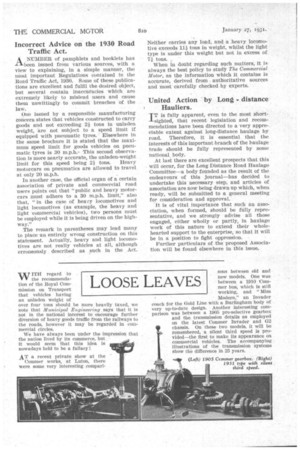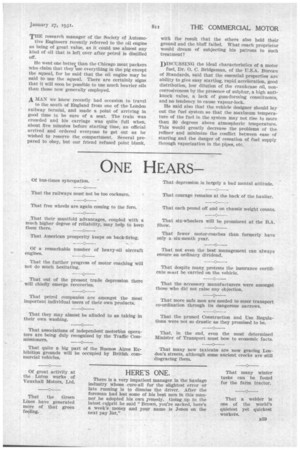LOOSE LEAVES
Page 36

Page 37

If you've noticed an error in this article please click here to report it so we can fix it.
WITH regard to the recommendation of the Royal Commission on Transport that vehicles having an unladen weight of over four tons should be more heavily taxed, we note that Municipal Engineering says that it is not in the national interest to 'encourage further diversion of heavy goods traffic from the railways to the roads, however it may be regarded in commercial circles.
We have always been under the impression that the nation lived by its commerce, but it would seem that this idea is nowadays held to be a fallacy !
AT a recent private show at the Commer works, at Luton, there were some very interesting compari
sons between old and new models. One was between a 1910 Commer bus, which is still working, and " Miss Modern," an Invader coach for the Gold Line with a, Burlingham body of very up-to-date design. Another interesting comparison was between a 1905 pre-selective gearbox and the transmission details as employed on the latest Commer Invader and 02 chassis. On these two models, it will be remembered, a silent third speed is provided—the first to make its appearance on commercial vehicles. The accompanying illustrations of the transmission systems show the difference in 25 years. THE research manager of the Society of 'Automo tive Engineers recently referred to the oil engine as being of great value, as it could use almost any kind of oil that is left over after petrol is distilled off.
He went one better. than the Chicago meat packers who claim that they use everything, in the pig except the squeal, for he said that the oil engine may be said to use the squeal. There are certainly signs that it will soon be possible to use much heavier oils than those now generally employed.
A MAN we know recently had occasion to travel to the south of England from one of the London railway termini, and made a point of arriving in good time to be sure of a seat. The train was crowded and his carriage was quite full when, about five minutes before starting time, an official arrived and ordered everyone to get out as he wished to reserve the comparttnent. Several prepared to obey, but our friend refused point blank, with the result that the others also held their ground and the bluff failed. What coach proprietor would dream of subjecting his patrons to Such treatment?
DISCUSSING the ideal characteristics of .a motor fuel, Dr. 0. C. Bridgman, of the U.S.A. Bureau of Standards, said that the essential properties are ability to give easy starting, rapid acceleration, good distribution, low dilution of the crankcase oil, noncorrosiveness by the presence of sulphur, a high antiknock value, a lack of gum-forming constituents, and no tendency to cause vapour-lock.
He said also that the vehicle designer should lay out the fuel system so that the maximum temperature of the fuel in the system may not rise to more than 30 degrees above atmospheric temperature. This would greatly decrease the problems of the refiner and minimize the conflict between ease of starting and the danger of cessation of fuel supply through vaporization in the pipes, etc.'




































































































